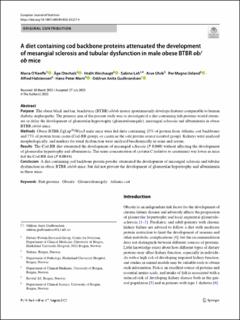A diet containing cod backbone proteins attenuated the development of mesangial sclerosis and tubular dysfunction in male obese BTBR ob/ob mice
O'Keeffe, Maria; Oterhals, Åge; Weishaupt, Hrafn; Leh, Sabine; Ulvik, Arve; Ueland, Per Magne; Halstensen, Alfred; Marti, Hans Peter; Gudbrandsen, Oddrun Anita
Journal article, Peer reviewed
Published version

Åpne
Permanent lenke
https://hdl.handle.net/11250/3092362Utgivelsesdato
2023Metadata
Vis full innførselSamlinger
- Department of Clinical Medicine [2044]
- Registrations from Cristin [9489]
Sammendrag
Purpose
The obese black and tan, brachyuric (BTBR) ob/ob mouse spontaneously develops features comparable to human diabetic nephropathy. The primary aim of the present study was to investigate if a diet containing fish proteins would attenuate or delay the development of glomerular hypertrophy (glomerulomegaly), mesangial sclerosis and albuminuria in obese BTBR ob/ob mice.
Methods
Obese BTBR.CgLepob/WiscJ male mice were fed diets containing 25% of protein from Atlantic cod backbones and 75% of protein from casein (Cod-BB group), or casein as the sole protein source (control group). Kidneys were analysed morphologically, and markers for renal dysfunction were analysed biochemically in urine and serum.
Results
The Cod-BB diet attenuated the development of mesangial sclerosis (P 0.040) without affecting the development of glomerular hypertrophy and albuminuria. The urine concentration of cystatin C (relative to creatinine) was lower in mice fed the Cod-BB diet (P 0.0044).
Conclusion
A diet containing cod backbone protein powder attenuated the development of mesangial sclerosis and tubular dysfunction in obese BTBR ob/ob mice, but did not prevent the development of glomerular hypertrophy and albuminuria in these mice.
